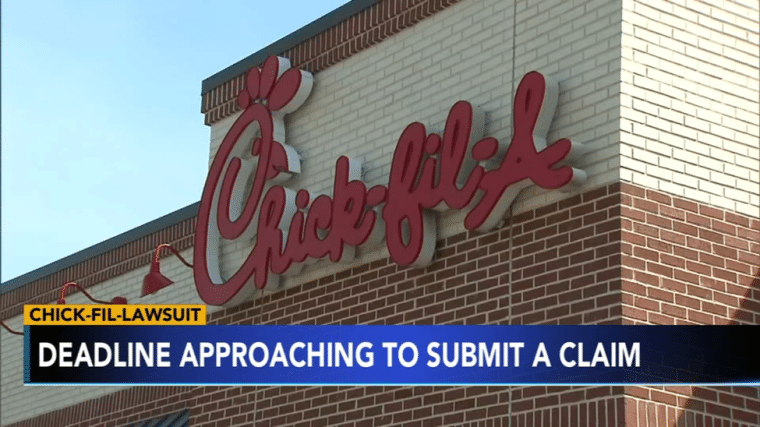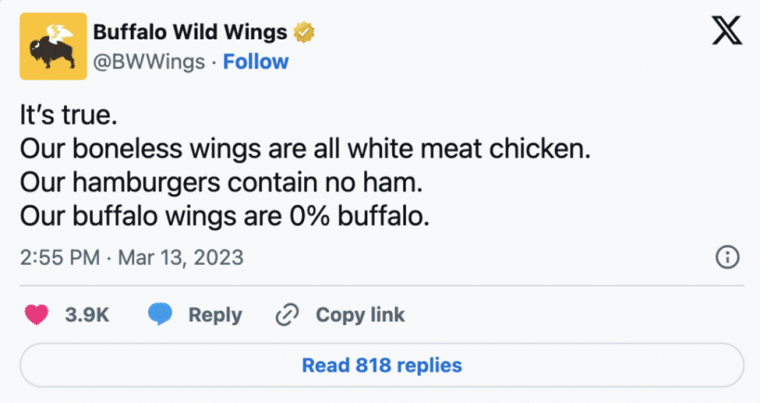Businesses in just about every industry are finding themselves in the midst of class action lawsuits these days. Recently, consumers have sued top brands like Crocs and Roblox, citing dishonest business practices and other shady behavior. Even Google has been drawn into the class-action battlefield.
It’s not totally surprising when morally neutral brands stray from honest business practices. What may be shocking to some is when a business like Chick-fil-A, which is rooted in Christian values, settles a multi-million-dollar lawsuit for manipulated menu prices and deceptive advertising.
The Chick-fil-A class action lawsuit centered around claims that the fast-food chain overcharged customers for delivery orders during the pandemic. Customers who ordered delivery directly from a Chick-fil-A location via the company’s branded app or website were impacted.
While the deadline to submit a claim has already passed, the suit has major implications for Chick-fil-A customers and all consumers who use fast-food delivery services. Here’s what you need to know.
Background of the Chick-fil-A Class Action Lawsuit
Chick-fil-A promised customers low delivery fees during the COVID pandemic. At face value, the fees seemed to be as advertised. Chick-fil-A has even maintained the low delivery fees, which are $2.99 or $3.99, depending on the area.
Chick-fil-A isn’t the only fast-food chain trying to appeal to cash-strapped consumers. McDonald’s recently rolled out a new “$5 Meal Deal” to draw in more business and offer savings opportunities to consumers who are unhappy about rising food prices.
Unlike McDonald’s limited-time offer, Chick-fil-A’s promise seemed too good to be true. The chicken fast-food chain raised its menu prices to cover their “low” fees. While the exact price increase depended on the item, some products cost up to 30% more than usual. The added charge raised menu items by as much as $5 to $6, according to court documents.
The upcharges occurred between November 1, 2019, and April 30, 2021. Eligible customers must have placed an order within this timeframe to be part of the claim. They must have also resided in one of five states specifically named in the settlement agreement: New Jersey, California, Georgia, New York, and Florida.
Chick-fil-A insisted that it did not do anything wrong. It’s important to point out that many fast-food restaurants raise menu prices when they provide delivery, especially through third-party services like Uber Eats or DoorDash. Still, Chick-fil-A’s actions may seem misleading to customers, especially since the chain publicly stated it would offer low delivery prices during the pandemic.
Details of the Class Action Settlement
The Chick-fil-A class action settlement totaled $4.4 million. Despite coming to terms with consumers, the fast-food chain never admitted guilt. It has since added a disclosure on its website and app stating that prices may be higher on delivery orders.
Ultimately, only consumers in the five aforementioned states were eligible to file a claim. The offense window was the same for consumers in each jurisdiction.
The fund was grouped into a $1.45 million payment for cash settlement awards and a $2.95 million payment for gift card settlement awards. It’s not uncommon for settlement funds to be divided into two or more groups, each of which is earmarked for specific purposes.
When submitting a claim form, eligible parties could indicate whether they wanted a digital gift card or cash payment. Regardless of which disbursement method the person chose, they could receive a maximum award amount of $29.25.
Who Was Eligible to File a Claim?
Consumers who placed an order through the Chick-fil-A app or via the company’s website were eligible to file a claim if they:
- Ordered between November 1, 2019 and April 30, 2021
- Lived in California, Florida, Georgia, New Jersey, or New York
- Submitted their claim by the February 15, 2024 deadline
Anyone who ordered from a store outside of the five settlement subclass states was ineligible.
Settlement Award Distribution
The maximum award amount was $29.25 per claimant. Eligible parties could request a cash award or receive their funds via a digital gift card. After cash payments were exhausted, all remaining individuals who filed within the designated time frame would receive a gift card.
Key Dates and Deadlines

The window to file a claim has already passed. The claim submission deadline was February 15, 2024, and the final approval hearing date was February 29, 2024. After the judge approved the settlement, Chick-fil-A’s settlement administrator began disbursing payments. All payments have been made at this time.
Chick-fil-A’s Position and Response
Chick-fil-A never admitted to any wrongdoing. The company has not made any public statements about the incident. However, it did add a disclosure on its website and mobile app saying that delivery menu prices can be higher than in-store pickup prices.
The recent settlement is the first time Chick-fil-A has been hit hard in court. However, it’s not the first time the chicken fast-food chain has felt the wrath of consumers. The company had a major brush with controversy in 2012 after CEO Dan Cathy publicly opposed same-sex marriage. While the incident occurred over a decade ago, Chick-fil-A is still dealing with fallout from the LGBTQ community to this day.
Cathy made significant efforts to soften his stance on the same-sex marriage issue. Perhaps the fast-food chain should take a page out of that playbook while dealing with the class action lawsuit and admit that it misled consumers.
Impact on Consumers and the Fast-Food Industry
The Chick-fil-A class action settlement drew attention to a common practice among restaurants that offer food delivery — price hikes. Just about every business that offers food delivery via a third party increases menu prices. The Chick-fil-A incident is unique in that the company was raising prices on its own app and website, which is part of why consumers felt the practice was deceptive.
So why do Chick-fil-A and other fast-food chains raise prices for delivery? Usually, it’s to offset what platforms like Uber Eats and DoorDash charge them.
Uber Eats charges establishments 15% to 30% per delivery. Pick-up orders placed through Uber Eats incur a 6% fee that the restaurants must pay. Even if the restaurant’s staff delivers the food, Uber Eats takes a 15% fee to facilitate the transaction.
Businesses raise their menu prices to offset these fees. Most of the time, they aren’t making any more than they would have if you came in and picked up the food yourself.
Similar Cases in the Fast-Food Industry
The fast-food industry is no stranger to class action lawsuits. Here’s a look at a few big cases that have emerged over the last few years:
Customers Complain About Whopper Shrinkage
Burger King was hit with a lawsuit in 2022 over allegations that its ads overstated the amount of meat in its sandwiches, including the Whopper burger. Consumers complain that the photos and ads on store menu boards show burger patties that are 35% larger and have double the meat of the items they purchase. The case is ongoing.
Consumers Had Beef With Taco Bell’s Beef Tacos
New York consumers filed a false advertising lawsuit against Taco Bell, claiming the company overstates how much beef is in its tacos, Crunchwraps, and other products. Consumers are seeking $5 million in damages. This case is also ongoing.
Buffalo Wild Wings Takes to X Over “Wingless” Boneless Wings
In 2023, consumers sued Buffalo Wild Wings and challenged the authenticity of its boneless wings. The plaintiffs complained that the products don’t actually contain deboned chicken wings. Most brands abstain from public comments during a suit, but Buffalo Wild Wings took to X to clap back at plaintiffs. Here’s what it said:

All of these suits are ongoing. If you have eaten at any of these establishments, keep an eye on these claims. If a settlement is reached, you may be eligible to file a claim.
Other Notable Class Action Settlements
Class action lawsuits have the potential to reshape our society and have lasting implications for your interactions with big brands. With that in mind, here’s a quick rundown of four other major class-action settlements outside of the fast-food space:
Walmart
In early 2024, Walmart agreed to a $45 million settlement over allegations of weighted groceries. Consumers noticed discrepancies in the prices of select items, including bagged citrus products, meats, and a few other perishable groceries. Eligible consumers had until June 5, 2024, to file a claim and could receive up to $500 as part of the cash settlement.
Facebook agreed to a $725 million settlement in response to its data scraping scandal involving Cambridge Analytica. The incident started over six years ago and involved millions of US Facebook users between mid-2007 and the end of 2022. The original submission window has already closed, but recent appeals delayed payment and may prompt the settlement administrator to open a new filing window.
Verizon
Verizon joined the list of major companies to settle class action lawsuits in 2024. Last year, the company experienced a data breach that exposed 63,206 employees’ sensitive information. However, the company didn’t notify affected employees until three months later.
The company faced another class action lawsuit in 2023. In this incident, consumers sued the cell service provider for questionable administrative fees. Verizon ultimately agreed to a $100 million settlement to cover all affected customers.
Amazon
Amazon is involved in an ongoing lawsuit for changing the terms of its Prime Video subscriptions without providing adequate notice to consumers. Participants in the suit are seeking $5 million in damages, claiming that Amazon’s actions amount to false advertising and deception.
If you subscribed to Prime before December 28, 2023, you may be eligible for compensation. However, the case is still in its very early stages and could get tossed out. Either way, it’s worth keeping an eye on.
Lessons Learned for Consumers
The Chick-fil-A class action settlement is an important reminder that consumers must be diligent anytime they are ordering from a business. Chick-fil-A is far from the only company that upcharges its items for delivery. Remember that the delivery fees rarely tell the whole story. Therefore, it’s important to compare the online self-pickup menu costs with the delivery prices.
If you are torn between the convenience of having food delivered to your door and saving some money, take a few minutes to look at both sets of prices. Spending a few extra dollars might be an acceptable trade-off, but paying an extra 30% for a large order for your whole family may offset the convenience factor. It’s all about what’s most important to you.
Keeping up with settlements like the Chick-fil-A incident can be tough. Pay close attention to local and regional news outlets, as they often share information about these cases before the settlement window closes. However, the companies involved in the suits do their best to keep these public relations nightmares under wraps.
How the Settlement Impacts You
The Chick-fil-A settlement serves as a critical reminder of the need for transparency in the fast-food industry’s digital ordering era. Be vigilant about delivery fees and understand your rights so you can make informed decisions and avoid excessive costs.
Fast-food chains are going to continue upcharging for convenience. That’s why you need to conduct your own pros/cons analysis to decide whether you’d be better off picking up the food yourself. Before you place another delivery order, ask yourself, “Is the convenience really worth it?”